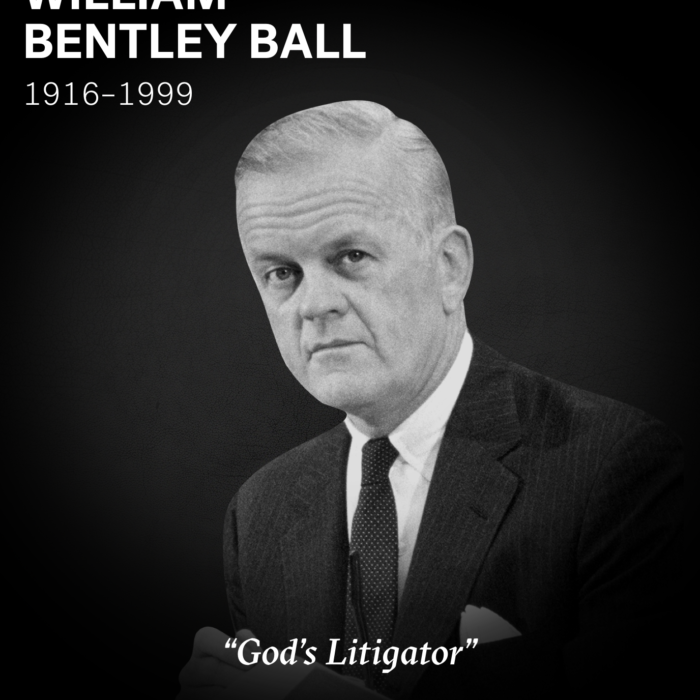
Dates: 1916–1999
Quote: God’s Litigator
Quote credit: Douglas Kmiec, legal scholar, 1995
Image credit: The American Catholic History Research Center and University Archives (ACUA), The Catholic University of America, Washington, DC
Synopsis copy: William Bentley Ball, a Catholic layman and one of the nation’s foremost religious liberty litigators, argued nine cases before the United States Supreme Court and advised on 25 others. He influenced court opinion.
Image credit: The American Catholic History Research Center and University Archives (ACUA), The Catholic University of America
Body copy: A Roman Catholic layman, William Bentley Ball devoted his life as a constitutional lawyer to fighting for religious liberty. He garnered national attention by winning precedent-setting U.S. Supreme Court cases.
Date: Oct. 6, 1916
Title: Born in Rochester, NY
Description: Ball’s family moved to Cleveland, OH, shortly after he was born. He was raised as a patriotic American Catholic. Later he became a member of the Order of St. Gregory the Great. His deep Catholic faith motivated him to take up the law, guiding his legal career, and directing his personal life.
Image caption: Catholic cathedral in Cleveland, Ohio
Image credit: Cleveland State University, Michael Schwartz Library, Special Collections
Date: 1941–1945
Title: Serves in the U.S. Navy During World War II
Description: Having served in the 107th Cavalry Regiment of Ohio’s Army National Guard, at the outbreak of World War II, Ball was commissioned as an officer in the U.S. Navy. Assigned to the heavy cruiser USS Quincy, by the war’s end he had attained the rank of lieutenant commander.
Image caption: William Bentley Ball in his military uniform, ca. 1941
Image credit: The American Catholic History Research Center and University Archives (ACUA), The Catholic University of America
Date: 1948
Title: Earns Juris Doctor Degree from Notre Dame Law School
Description: After the war, Ball enrolled in the University of Notre Dame’s law school, where he studied religion and law and the relationship of church and state. As evidenced by his detailed law school notes, he prepared himself for a career as a constitutional lawyer who was devoted to defending religious liberty.
Image caption: Notes from a law school course reveal Ball’s early engagement with the intersection of the Constitution with religious liberty.
Image credit: The American Catholic History Research Center and University Archives (ACUA), The Catholic University of America
Date: 1967
Title: Offers Counsel in His First Case Before the U.S. Supreme Court, Loving v. Virginia
Description: In the first of his U.S. Supreme Court cases, Ball filed a brief on behalf of 25 Catholic bishops supporting the Lovings, an interracial couple whose marriage had been legally challenged by the Commonwealth of Virginia. The Court’s decision overturned laws that banned interracial marriages or miscegenation.
Image caption: Richard and Mildred Loving, an interracial couple who legally challenged a Virginia state law that deemed their marriage illegal
Image credit: Bettmann / Contributor
Date: 1972
Title: Argues Before the U.S. Supreme Court in Wisconsin v. Yoder
Description: Ball is best known for this landmark case, in which he successfully argued for the religious and parental rights of the Amish. He made the case that it is a violation of religious liberty for the government to make high school attendance compulsory for the Amish.
Image caption: Amish respondents in Wisconsin v. Yoder climb the steps of the U.S. Supreme Court.
Image credit: AP Photo/John Duricka
Date: 1993
Title: Wins His Last U.S. Supreme Court Case: Zobrest v. Catalina Foothills School District
Description: Ball represented James Zobrest, a hearing-impaired student before the U.S. Supreme Court, successfully arguing that the Establishment Clause of the First Amendment does not prohibit public school funding for an interpreter at a Catholic parochial school. It was a precedent-setting case for the disabled.
Image caption: William Bentley Ball speaks to the press in front of the U.S. Supreme Court with his client James Zobrest and his family.
Image credit: The American Catholic History Research Center and University Archives (ACUA), The Catholic University of America
Date: Jan. 10, 1999
Title: Dies after a Short Illness, at 82
Description: Later in his life, Ball remained active in the legal community. He continued to teach and write books and articles on religious and parental rights. Ball had a creative streak and was known for his playful caricatures and limericks.
Image caption: Untitled cartoon and poem by Ball; this is one of many artworks he produced throughout his life.
Image credit: The American Catholic History Research Center and University Archives (ACUA), The Catholic University of America
Question/alignment statement: Do you think that expression of religious views as well as the practice of religion in public, for example prayer, should be protected by law?
Image credit: S. Greg Panosian
Scripture: I study your instructions; I examine your teachings. I take pleasure in your laws; your commands I will not forget.
Scripture credit: Psalm 119:15–16
Image credit: The American Catholic History Research Center and University Archives (ACUA), The Catholic University of America
Related changemakers: Tommy Whall, Gratz, Evarts